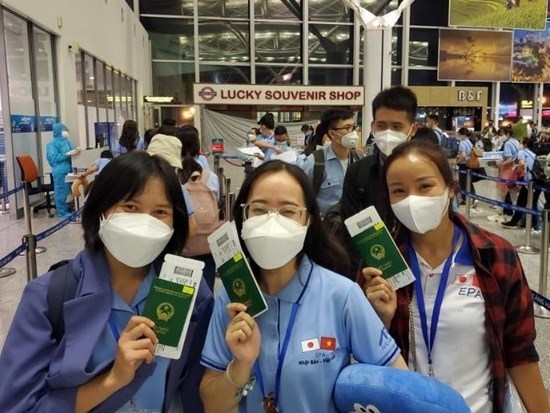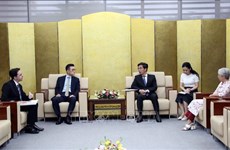Wide door opened for Vietnamese nurses, caregivers in Japan
The Ministry of Labour, Invalids, and Social Affairs’ Department of Overseas Labour continues to receive applications for the recruitment of nurses and caregivers to study and work in Japan until the end of October 31, given the host nation’s serious shortage of medical human resources.
 Vietnamese nurses and caregivers on their way to Japan (Photo: VietnamPlus).
Vietnamese nurses and caregivers on their way to Japan (Photo: VietnamPlus).In the context that the Japanese market was almost "frozen" during the past eight months, the Department of Overseas Labour coordinated with the Japanese Embassy in Vietnam to send more than 200 nursing and caregiving candidates to work in Japan in mid-September. This reflects the host country’s high demand for human resources groups.
The cooperation programme to send nurse and caregiver candidates to Japan to work under the Vietnam-Japan Economic Partnership Agreement (VJEPA) has been officially implemented by the two countries since 2012. It has so far taken nearly 1,900 Vietnamese nurses and caregivers to work in Japan through eight courses.
Currently, the Vietnamese candidates of the 9th course, who were selected in 2020, are still receiving online Japanese training due to COVID-19. The course is expected to be completed in this December. They will begin departing in mid-2022.
Tran Thi Van Ha, head of the department’s information and communications office, said the trainees will receive a monthly salary of between 35 million VND (1,546 USD) and 39 million VND, or even higher, if they pass Japan’s national certification test.
Passing the test means they can switch to a work visa and can work in Japan long-term. They will also have the right to negotiate salaries and to choose medical facilities offering benefits that meet their requirements, stressed Ha.
Japan's receiving facilities have reported very good assessments of Vietnamese candidates. The pass rate of the Vietnamese candidates taking the Japanese national certification test is the highest among countries sending candidates, which include the Philippines and Indonesia. The rate for Vietnam's caregiver and nurse candidates are more than 90 percent and 70 percent, respectively. The programme is a highlight of the human resources cooperation relationship between Vietnam and Japan.
Pham Viet Huong, Deputy Director of the department, said that Japan is currently facing a serious shortage of human resources, especially in the medical field. In October, the department is receiving applications for the 10th course of training nurses and caregivers for working in Japan. The course’s quota is 240 people.
The candidates are all under 35 years old and have graduated from colleges or universities majoring in nursing and general nursing. The department will accept applications until the end of October 31. The selection is expected to take place in mid-November. The selected candidates will be supported by the two governments with the full cost of one-year Japanese language learning, accommodation and living expenses during the training process. While studying and working in Japan, candidates are entitled to a salary of 160,000-180,000 JPY a month.
According to Huong, in October, Japan officially lifted the state of emergency due to the COVID-19 pandemic in Tokyo and 18 provinces, as well as the semi-emergency state in the remaining regions. The country has gradually switched to the new normal condition. In addition, Japan has relaxed its isolation regulations for visitors who have been vaccinated against COVID-19. Vaccinated cases only need to be isolated at home for 10 days upon entry, four days less than the previous order.
“The above-said positive signals show that the Japanese Government is step-by-step easing restrictions in order to resume socio-economic activities. When the pandemic situation is under control, it is likely that in the near future, Japan will resume its reception of Vietnamese interns, technicians, engineers, and high-tech workers, among others,” said Huong./.













